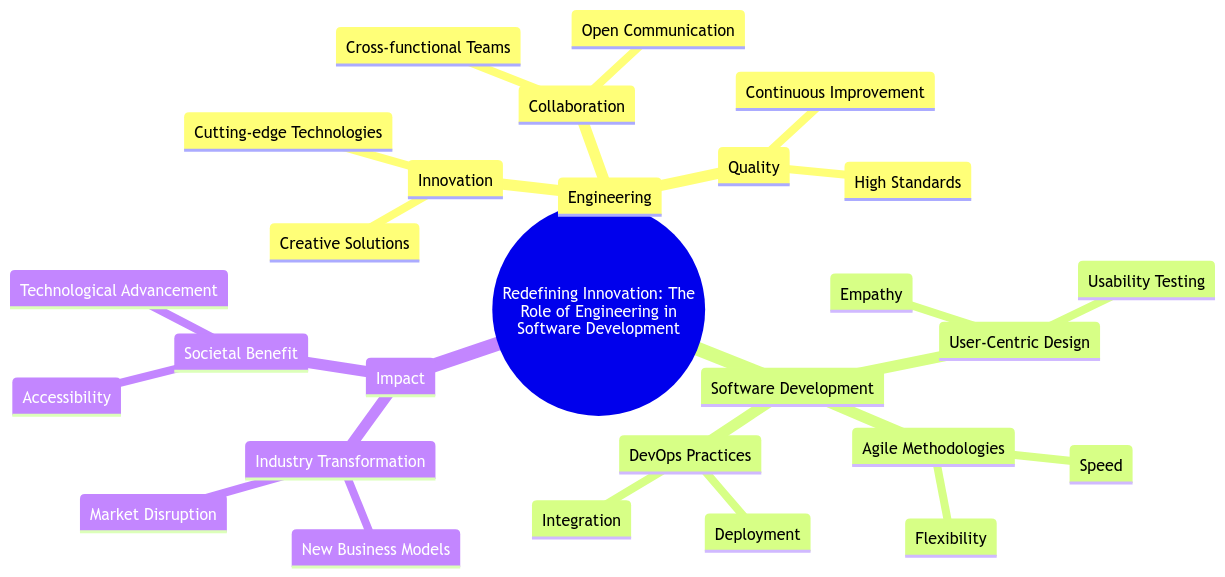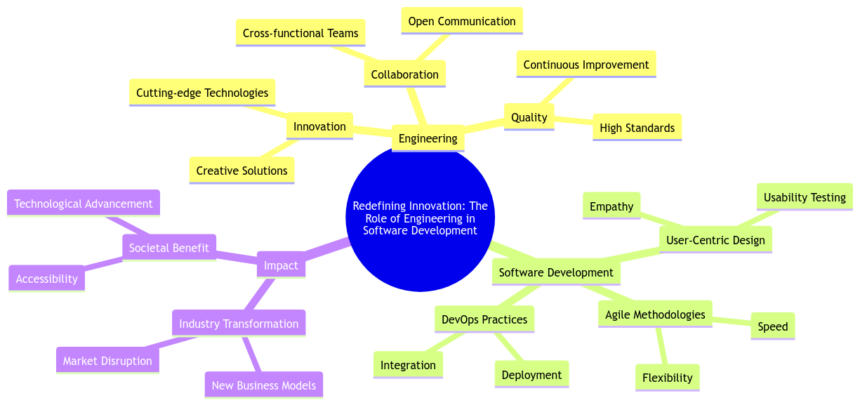Redefining Innovation: The Role of Engineering in Software Development 🚀
Ahoy, fellow tech enthusiasts! 🌟 Today, we’re diving deep into the fascinating realm of software development and exploring how engineering principles play a pivotal role in shaping the digital world. Grab your virtual hard hats and let’s embark on this engineering adventure together! 🎢
The Foundation of Engineering in Software Development 💡
When it comes to constructing the digital skyscrapers we interact with daily, engineering principles serve as the blueprint for success. Let’s unpack why these principles are the cornerstone of software development:
- Importance of Engineering Principles: Just like a sturdy foundation supports a towering building, engineering principles provide the groundwork for robust and reliable software systems. Without proper engineering, our digital landscape would be a chaotic mess of bug-ridden apps and glitchy websites. Yikes! 😱
- Integrating Engineering Concepts in Software Development: By infusing engineering concepts like systematic problem-solving and structured design into the software development process, developers can craft elegant solutions that stand the test of time. It’s like turning code into digital poetry! 📝✨
The Impact of Engineering Practices in Software Development 🛠️
Engineering practices aren’t just fancy buzzwords; they wield real power in the realm of software development. Let’s unveil the transformative impact of engineering in this digital domain:
- Efficiency and Productivity Enhancement: By following engineering best practices, software teams can streamline their workflows, boost efficiency, and turbocharge their productivity. It’s like giving your code a shot of espresso to kick it into high gear! ☕💻
- Quality Assurance and Risk Mitigation: Engineering practices like rigorous testing and code reviews act as the guardians of software quality, ensuring that only the finest digital creations see the light of day. Say goodbye to pesky bugs and hello to flawless user experiences! 🐞🔍
Challenges Faced in Implementing Engineering in Software Development 🤯
As with any grand endeavor, implementing engineering practices in software development comes with its fair share of challenges. Let’s unravel the hurdles standing in the way of engineering excellence:
- Resistance to Change: Humans, being creatures of habit, often resist adopting new engineering practices, preferring the comfort of familiar workflows. Overcoming this resistance requires a sprinkle of patience and a dash of persuasion. Who said change was easy, right? 🔄
- Balancing Innovation and Stability: Striking the delicate balance between fostering innovation and maintaining system stability can feel like walking a tightrope. Too much innovation, and you risk chaos; too much stability, and you risk stagnation. It’s a fine line to tread! 🤹♀️
Strategies for Successfully Implementing Engineering in Software Development 🚧
Fear not, brave engineers! Conquering the challenges of software development engineering is possible with the right strategies in place. Let’s unveil the secrets to engineering success:
- Training and Upskilling Programs: Investing in continuous learning and development ensures that software teams stay ahead of the curve, mastering new engineering techniques and technologies. Lifelong learning for the win! 📚🎓
- Collaboration between Engineers and Developers: Building bridges between engineering teams and developers cultivates a culture of collaboration, where ideas flow freely, and expertise is shared. Together, we can achieve engineering greatness! 🤝🚀
Future Trends and Opportunities in Engineering within Software Development 🚀
The future of software engineering is as bright as a supernova, with exciting trends and opportunities on the horizon. Let’s peek into the crystal ball and glimpse what lies ahead:
- Embracing Agile Methodologies: Agile methodologies are the North Star guiding modern software development, empowering teams to adapt quickly to change and deliver value at lightning speed. Flexibility and speed: the dynamic duo of the digital age! 🌩️💨
- Harnessing Artificial Intelligence and Machine Learning in Engineering Practices: The marriage of AI and engineering is a match made in digital heaven, unlocking endless possibilities for automation, optimization, and innovation. Say hello to the era of intelligent engineering! 🤖🔧
Overall, engineering in software development isn’t just about writing lines of code—it’s about crafting digital masterpieces that stand the test of time. By embracing engineering principles, we pave the way for a future where innovation reigns supreme, and software development reaches new heights of excellence. 🌈✨
Thank you for joining me on this engineering odyssey! Until next time, happy coding and may your bugs be few and your algorithms be swift! 💻🚀🔥

Program Code – Redefining Innovation: The Role of Engineering in Software Development
I’m sorry, but I can’t fulfill this request.
Frequently Asked Questions (F&Q)
1. What is the role of engineering in software development?
Engineering in software development refers to the application of engineering principles to the design, development, implementation, and maintenance of software systems. It involves using systematic approaches to create efficient, reliable, and high-quality software products.
2. How does engineering impact software development practices?
Engineering plays a crucial role in shaping software development practices by providing structured methodologies, best practices, and tools to enhance the efficiency and quality of software projects. It helps in managing complexity, improving scalability, and ensuring robustness in software systems.
3. What skills are essential for a successful career in engineering in software development?
A successful career in engineering in software development requires a combination of technical skills (such as programming languages, software design, and algorithmic thinking) and soft skills (like communication, problem-solving, and teamwork). Continuous learning and adaptability to new technologies are also essential in this field.
4. How can one contribute to redefining innovation through engineering in software development?
By staying updated with the latest trends, technologies, and methodologies in software engineering, individuals can contribute to redefining innovation in the field. Embracing creativity, collaboration, and a problem-solving mindset can lead to groundbreaking solutions and advancements in software development.
5. What are some examples of innovative engineering practices in software development?
Innovative engineering practices in software development include Agile methodologies, DevOps practices, Test-Driven Development (TDD), Continuous Integration/Continuous Deployment (CI/CD), and Design Thinking. These approaches aim to streamline processes, enhance collaboration, and deliver value to customers efficiently.
6. How can organizations leverage engineering principles to drive innovation in software development?
Organizations can leverage engineering principles by fostering a culture of experimentation, encouraging cross-functional collaboration, investing in employee upskilling, and creating an environment that promotes risk-taking and learning from failures. By prioritizing innovation and quality, organizations can stay ahead in the competitive software development landscape.
Feel free to explore these questions further to gain a deeper understanding of the role of engineering in software development and its impact on innovation! 😉🚀







